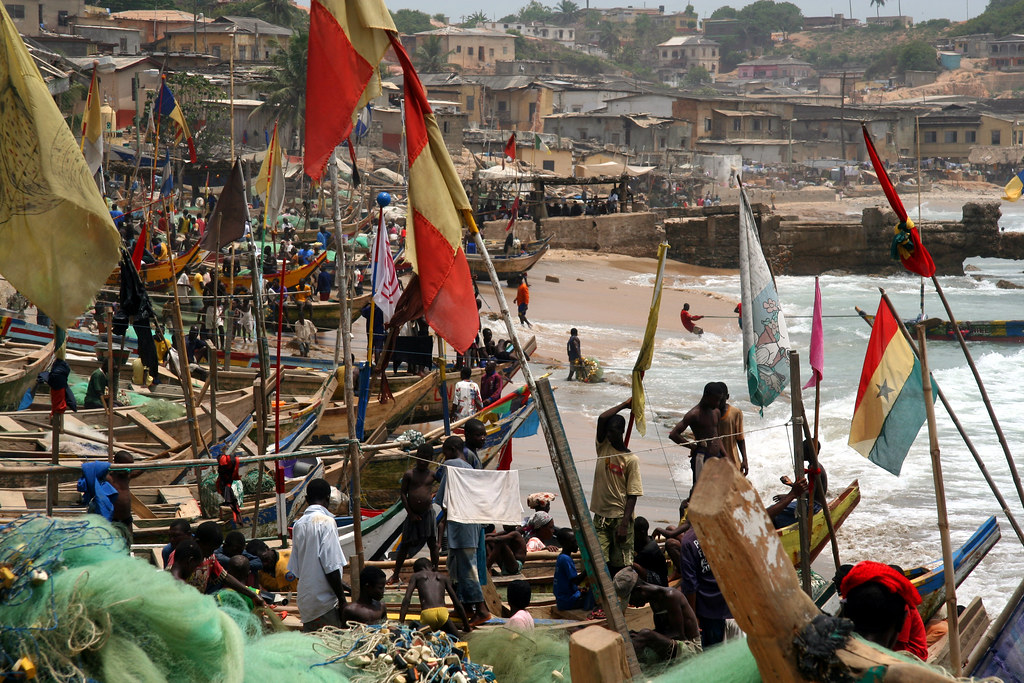ADF STAFF
A woman prayed in the rubble of a mosque on the beach at Jamestown, Ghana.
Nearby, despondent men sifted through the wreckage of the historic fishing community, looking for anything they could salvage from their homes and businesses.
A school was leveled, a playground destroyed and an area where locals played soccer on the beach was covered with debris.
Ghanaian leaders promised for years to revitalize Accra’s iconic fishing community, a popular tourist attraction where locals row colorful canoes into the Gulf of Guinea to catch fish that are smoked on the beach and sold locally. Officials procured a $60 million grant from China to build the new harbor, but many residents say they were given little warning before bulldozers razed the area.
“I have four children, and we live here with my husband,” a local resident named Adoko told Agence France-Presse (AFP). “Now that they have demolished our building, when it rains I have to go to another person’s room and they can’t ask me to leave. Why do they come to demolish this place when they are not ready to develop this place? Now we’re all sleeping in the same room.”
When it is complete in about three years, the harbor will include a new school, offices, a market, cold-storage units and fish-processing facilities. The project is part of the government’s efforts to upgrade key landing sites, but some local fishermen fear that their livelihoods will be compromised. Jamestown is a community that dates back to the late 1600s, having developed around the British Fort James. About 100,000 artisanal fishermen work in Ghana’s coastal villages.
“I need a job over here,” a local resident named Ismaila told AFP. “The youth here, they need a job. Find ways and means to train them. If you don’t do so, do you know what is going to happen after this project is done? The Chinese, they will bring their people to come and work here. So where is the benefit?”
Ismaila has cause to worry.
China has expanded its long-range fishing fleets into parts of West Africa for years, often engaging in illegal, unreported and unregulated fishing practices that deprive locals of food and income by decimating fish populations.
Steve Trent, executive director of the Environmental Justice Foundation, said in an email to ADF that Chinese-owned industrial trawlers in Ghana use undersize mesh nets and “mid-water trawls to illegally target the small pelagics [such as sardinella] reserved for artisanal fishers.” He added that sardinella populations have declined in Ghana by about 80% in the past two decades.
“Much of this fish — the majority [are] juveniles that are needed to rebuild the fishery — is transferred illegally to purpose-built canoes at sea in an illegal trade known locally as ‘saiko,’” Trent said. “These ‘saiko’ canoes transport the fish to shore for sale back to local communities for profit. This practice is fueling the collapse of the small pelagic fishery, on which over 2.7 million Ghanaians rely for their livelihoods.”
Trent said industrial trawlers in Ghana should only target bottom-dwelling species such as octopus, for which they are licensed. The high-value species often are exported from Ghana to China and to European markets.
The increasing number of Chinese vessels fishing in the Gulf of Guinea could have a “highly damaging impact on the marine environment, on fisheries and on local livelihoods” unless they adhere to local regulations and “make their operations fully transparent,” Trent said.
“The Chinese distant water fleet is already catching as much of 50% of its total global catch in West African waters, and this fishing effort must be effectively controlled,” he added.

